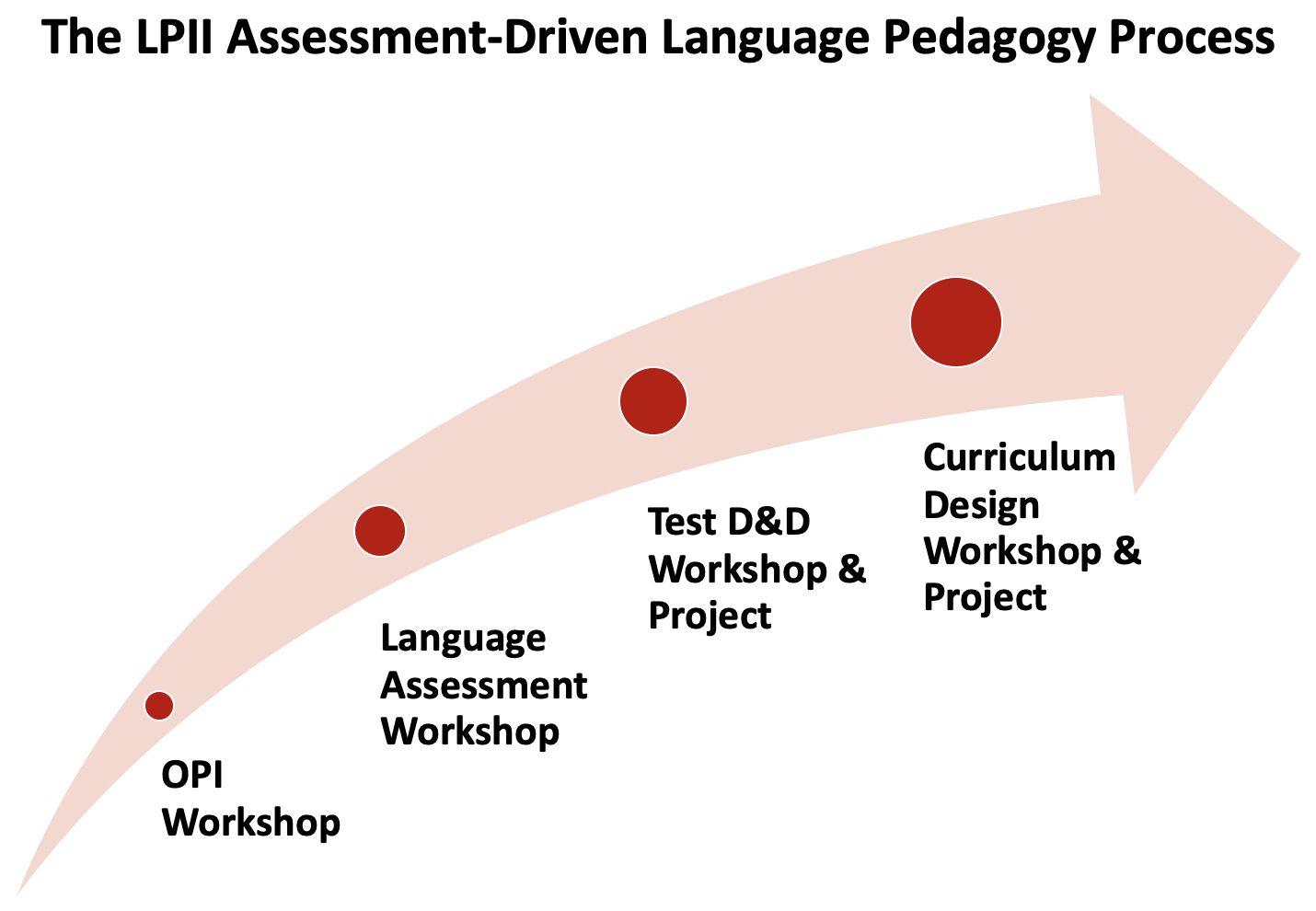LANGUAGE PEDAGOGY INNOVATION INITIATIVE GRANTS
Sponsored by the College, University of Chicago
In November 2017 the Chicago Language Center (CLC), with funding from the College, launched the Language Pedagogy Innovation InitiativeTM. This initiative is organized around a reverse design model that uses language assessment to spur innovation in language pedagogy and build a solid foundation for language teaching and testing practices across the University.
This initiative is an iterative cycle of language assessment workshops, test design and development, and curriculum design and development, with financial and professional development support at each step. The initiative covers three language proficiency levels: Language Competency, Practical Proficiency, and Advanced Proficiency.
- Competency: the ability to perform basic language functions expected after one year of language instruction.
- Practical Proficiency: the ability to function in most personal and some academic or professional settings.
- Advanced Proficiency: the ability to function in a wide variety of settings, including all personal settings and many academic or professional settings.
Cathy Baumann, UChicago Language Center Director, discusses the impact of assessment on language instruction in the LARC 2022 opening plenary.

The LPII Process – Proficiency-Oriented Reverse Design
Instructors do not need to complete a full cycle at each proficiency level, but they must attend the corresponding workshop before developing a test, and they must develop a test before they can apply for a curriculum grant.
Step 1: ACTFL Oral Proficiency Interview training. These workshops, led by ACTFL trainers, deliver comprehensive, functional comprehension of the levels and sublevels of the ACTFL Proficiency Guidelines, and jump-start the creation of a cohort of assessment experts. Participants use the Guidelines to identify proficiency-oriented learner outcomes at different points in the curriculum. For information on the next CLC-sponsored OPI training, contact Cathy Baumann.
Step 2: Language Assessment Workshop. This workshop builds a foundation of assessment literacy in the two components that are integral to all projects developed within the LPII: proficiency-oriented assessment and reverse design. Learn more about the Language Assessment Workshop.
Step 3: Test Design and Development. The Test Design Workshop focuses on reverse design, the impact of testing on teaching (i.e., washback), the operationalization of language skills at different proficiency levels into highly-reliable performance-based authentic assessment tasks. Upon completion of this workshop, each participant has designed a four-skills (reading, writing, speaking, listening) end-of-sequence test (for example, end-of-first-year). Learn more about Test Design and Development.
Step 4: Fully develop the designed test. Participants write prompts, find or create reading and listening inputs, finalize response formats, and create scoring rubrics. This work is done in close cooperation and collaboration with CLC staff to develop reliable tests that result in scores that help make valid inferences and decisions about students. Positioning ourselves as testing experts, we exert rigorous standards for both design and development, and walk each participant through rubric development and rater training.
Step 5: Curriculum Design. Once a newly developed assessment is in place, and in adherence to a reverse design model, instructors reexamine all aspects of their curriculum. The Curriculum Design Workshop uses a set of principles to guide instructors in this process. We encourage them to assume accountability for their learners to be successful with the assessment they themselves have designed. In contrast to the “hands-on” approach we assume in the test design and development phase, we rely on the instructors as experts in the teaching of their language – through the transformative impact of their having defined outcomes and designed and developed assessments to measure them. Learn more about Curriculum Design.
Step 6: Realign curricula. With support and feedback from CLC staff, instructors work independently to revise their curricula, depending on the needs they themselves have identified. Projects range from creating or locating new listening inputs, to integrating new speaking and writing activities, to the creation of entirely new courses or course sequences. Instructors share their work with each other in online symposia, and in the process share ideas, activities, and content-based units.
Other Initiatives
Domain Analysis – Languages for Specific Purposes
When the specific knowledge, skills, and abilities one must possess in order to function in the target domain (i.e., in the specific real-world language use context) is not readily available either through theoretically explained data or empirically collected evidence, then we first need to identify those target functions through a process called domain analysis. Learn more about Domain Analysis and the Languages for Specific Purposes initiative.
Online Language Course Development
For courses where the target skills and the target audience are well-suited for online delivery, online courses can be developed through the LPII. At present these are courses that are primarily online and asynchronous, with weekly synchronous meetings that can occur either online or in-person, depending on when the course is being offered. Learn more about Online Course Development.
